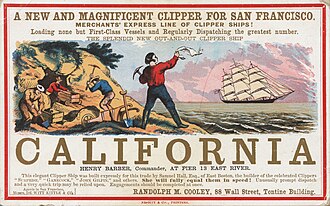
The California Dream is the psychological motivation to gain fast wealth or fame in a new land. Some argue that, as a result of the California Gold Rush after 1849, California's name became indelibly connected with the Gold Rush, and fast success in a new world became known as the "California Dream",[1] while others claim this concept did not emerge until the 1960s.[2] California was perceived as a place of new beginnings, where great wealth could reward hard work and good luck. The notion inspired the idea of an American Dream. California was seen as a lucky place, a land of opportunity and good fortune. It was a powerful belief, underlying many of the accomplishments of the state, and equally potent when threatened.[3]
Historian H. W. Brands noted that in the years after the Gold Rush, the California Dream spread across the nation:
The old American Dream . . . was the dream of the Puritans, of Benjamin Franklin's "Poor Richard" . . . of men and women content to accumulate their modest fortunes a little at a time, year by year by year. The new dream was the dream of instant wealth, won in a twinkling by audacity and good luck. [This] golden dream . . . became a prominent part of the American psyche only after Sutter's Mill.[4]
Overnight, California gained the international reputation as the "golden state"—with gold and lawlessness the main themes.[5]
- ^ Kevin Starr, Americans and the California Dream, 1850–1915 (1986)
- ^ Warren, Louis S. (May 1, 2023). "The California DreamHistory of a Myth". Pacific Historical Review. 92 (2): 260–298. doi:10.1525/phr.2023.92.2.260. ISSN 0030-8684. S2CID 258624023.
- ^ Starr, Americans and the California Dream and Starr, Inventing the Dream (1985)
- ^ Brands, 2003), p. 442.
- ^ Robert A. Burchell, "The Loss of a Reputation; or, The Image of California in Britain before 1875," California Historical Quarterly 53 (Summer I974): 115–30, shows that stories about Gold Rush lawlessness deterred immigration for two decades.